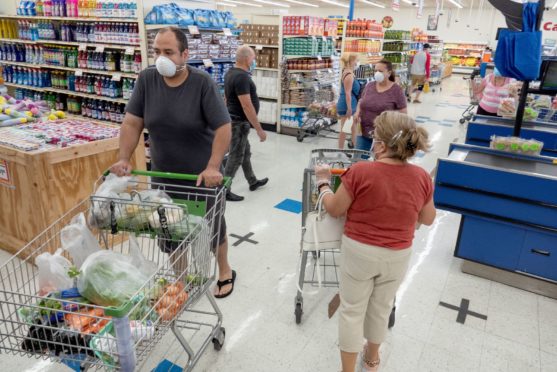It used to be just the supermarket but now it’s the cavern of Covid, a dark hole only to be entered when the last Pot Noodle has vacated the kitchen cupboard and all that is left to eat is a Scrooge-like morsel of cheese and a half chomped Mars Bar.
In there, other people are the enemy: Covid-carrying hoarders all of them. And haven’t they HEARD of social distancing, manically exiting through ‘entry’ with their trolleys, laden with 18 rolls of Andrex, six bottles of Pinot Grigio and a kitchen sign that says: ‘Wine is the answer. I have forgotten the question.’
The rules: enter quickly, scurry round with a scarf over your mouth, scowl at anyone who looks like they are going to reach that last chicken before you do, and exit. Simples.
Except that the alarm is going off on entry. The security man, complete with Important Uniform that suggests he’s doing a stint guarding Her Majesty’s prisoners, is sitting on the table of sanitisers, blocking their use. Literally. WHAT IS WRONG WITH PEOPLE?
I would reach over him except 1) I may get coronavirus 2) I want to get past the alarm, which is resounding so volubly it feels like someone is shaking my head on a stalk. Unnerved, I pick up an unsterilised basket rather than challenge the supermarket screw. “It’s you, isn’t it?” he says benignly, from the comfort of his throne on top of the sanitiser table.
My mind drifts back to this morning. Ah, yes. New top. Discovery of security tag still attached. Tuck it in…not visible…who’s going to know in lockdown? Deal with it later. Note to self: never do this again. “When you go home,” says the security man helpfully, “take out your cosmetic bag and remove any little bar codes from your lipsticks”. I nod meekly, pretending the ten decibels really could be caused by a rogue lippy. The truth is too humiliating.
My compadre has decided not humiliating enough yet. “Do you have one of those tag removers?” he asks the assistant at customer services, telling her about my shirt with the tag still attached. Of course, she says, just tell her to bring it in. “She’s over there,” he grins. “Wearing it. Didn’t you hear her?” Yeah, thanks. In the new world where people no longer look you in the eyes, she beckons me kindly, reaches over the counter and removes the tag. Embarrassed, I momentarily forget all about social distancing, sanitisers, and Covid.
Until I walk away. There are two elderly ladies waiting at the counter, steel grey perms perfectly in place. (Who’s cutting their hair?) Now supermarkets, as we know, are one of the few parts of the economy still operating. Sales have increased, ranging from almost 5% in Morrisons to a whopping 17% in Lidl. Sales of alcohol: up 31%. Toilet paper: up 87.9%. Household cleaners: up 98%. Children’s medicine: up 124%. Hand sanitiser: up 255%. Lots of empty shelves. The two ladies cannot get the purchase they are looking for. “I am sorry,” says the assistant, “We are completely out of sympathy cards.”
The words hit a raw, internal place. So many overwhelming things have been thrown at us in this new existence. Facts. Figures. Death rates. Revelations that the prime minister is, as we suspected, the political equivalent of the sixth former who wants to captain the football team but can’t be bothered showing up for practice. No Cobra meetings, no weekend working, no planning, no overtime. He’s exactly what everyone feared, said one of his own disgruntled team. So sure, things can get labelled wrongly sometimes. But if a tin says it contains beans, it most likely does.
I’d put Boris in the supermarket screw uniform and take the woman on the customer service counter for PM. She’s unlikely to do worse, given his idea of a reassuring coronavirus strategy was to shake hands with sufferers. This month, John Hopkins University released a table showing Covid death rates per hundred thousand of the population in countries run by women, compared to countries run by men. First the women: Taiwan has 0.2; New Zealand 0.23; Finland 1.63; Iceland 2.55; Norway 3.09; Germany 5.38. Then the men: US 11.82; UK 23.31; France 20.83; Italy 38.44; Spain 42.9. What did the women do? Something quicker than the men, obviously.
Back home, tag-less, my eyes smart and my nose runs. No, not Covid. I am watching the news, a lovely tale of a 17-year-old carer who got a cushion made up for an elderly male resident who went to sleep at night hugging a picture of his beloved late wife. The cushion has his wife’s photograph imprinted on it and his tears of delight say everything about the nature and the depth of human love. Why this treasure of a girl bothered with him, he didn’t know, said the old man. “Because I care,” said the 17 year old. And suddenly, the heavy gloom of our new existence seemed a little lighter, and the new world looked an awful lot like the old one.

